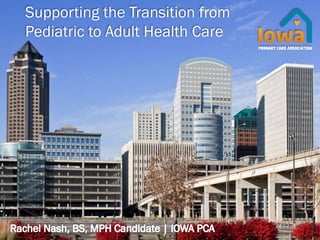River Hills Community Health Center Pediatrician Focus Group
- 1. Supporting the Transition from Pediatric to Adult Health Care
- 2. • Definition of Health Care Transition: The purposeful, planned and timely transition from child and family-centered pediatric health care to patient-centered adult-oriented health care. (Society for Adolescent Medicine, 1993) • The goal of a planned health care transition is to maximize lifelong functioning and well-being for all youth, including those who have special health care needs. • Only about 50 percent of parents report discussing their adolescents’ changing health care needs with a pediatrician, and of those only 42 percent had discussed switching to an adult provider. (Pediatrics, 2009) • Identified as a need by IPCA and RH staff
- 3. • A comprehensive and coordinated transition to adult care makes for better outcomes for children and young adults • Early education about transitioning helps youth feel more comfortable with taking on new responsibilities and more empowered when it comes to their own health • Successful transitions can help prevent readmissions to the hospital in young adulthood (18-24) • Transitioning to another RH provider helps with continuity of care and keeps children in one system
- 5. • Part 1: Quality Improvement Initiative – Patient Centered Medical Home Designation • 5C: Coordinate With Facilities and Care Transitions • “Collaborates with the patient/family to develop a written care plan for patients transitioning from pediatric care to adult care” – Pilot at River Hills Community Health Center (Pediatric Clinic) • Part 2: Develop Transitioning Toolkit – to be used by providers at all community health centers across Iowa
- 7. Transition of Care Checkbox *On Initial Intake form, Care Management Plan form, and Pediatric CC/HPI form **Currently shows up at age 16 – working to change it so checkbox appears at age 12
- 9. Adolescent Transition of Care Form • Added to two office visit types: – PEDS Chronic – PEDS Well-Child (+1 year) – Physicals • 14 Yes/No Questions broken down into three age ranges • 3 Domains – Increasing Adolescent Responsibility for Healthcare Management – Readiness Assessment for Transfer to Adult Care – Implementation of Transfer to Adult Care • Gradually complete questions as child moves through adolescence
- 10. Adolescent Transition of Care Form
- 12. HCT Index – Provider Survey
- 13. Other Transition Toolkits • http://newenglandconsortium.org/for- families/transition-toolkit/ • http://rwjms.rutgers.edu/boggscenter/product s/BeingaHealthyAdultHowtoAdvocateforYourHe althandHealthCare.html • http://healthytransitionsny.org/skills_media/to ol_show
- 14. Discussion • What are you already doing in your clinical practice to support this transition period? How do you think it could be improved? • How do you think parents will respond to these questions being asked? • How do you think adolescents will respond to these questions? • What educational materials might you need to supplement these discussion?
- 15. THANK YOU!
- 16. References • Lotstein, Debra S., et al. "Planning for health care transitions: results from the 2005–2006 national survey of children with special health care needs." Pediatrics 123.1 (2009): e145-e152. • Cooley, W. Carl, and Paul J. Sagerman. "Supporting the health care transition from adolescence to adulthood in the medical home." Pediatrics 128.1 (2011): 182-200.
















